Sun 15 May 2022
A Book! Movie!! Review by David Vineyard: JACK HIGGINS – The Wrath of God // Film (1972).
Posted by Steve under Action Adventure movies , Reviews[9] Comments
â— JACK HIGGINS – The Wrath of God. Originally published as by James Graham (Macmillan, UK, hardcover, 1971; Doubleday, US, hardcover, 1971; Dell, US, paperback, 1974).
â— THE WRATH OF GOD. (1972) Robert Mitchum, Ke.n Hurchinson, Victor Buono, Frank Langella, Rita Hayworth. Director: Ralph Nelson.
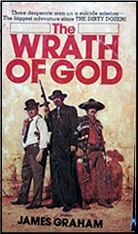
I may shock some here who know what a fan of the British adventure/thriller genre I am, but I stopped reading Jack Higgins after The Eagle Has Landed, his breakthrough bestseller and never went back. I dipped my toes in once in a while, but honestly I just was not interested. To me he was always the least of the major names in the genre, not in the same class as MacLean, Lyall, or Bagley and certainly not Innes, Household, and Canning.
Some of those later books I found nearly unreadable. Major bestselling writer, hugely popular, films, mini-series, but I had moved on. He just did not interest me anymore. I don’t even like Eagle, or the movie based on it.
As a writer, Higgins simply was not a good enough to get me to pull for German commandos trying to assassinate Churchill and their traitorous charismatic IRA helper. I’m just not sophisticated enough to enjoy an entertainment when I’m pulling for the main characters to be shot as soon as possible, not unless the writer is a hell of a lot more skilled than Jack Higgins was.
But noting his recent death I thought I would look at my favorite Higgins novel, because once upon a time I read him faithfully and had high hopes for him.
Higgins, real name Harry Patterson, was a school teacher who decided writing was more fun and paid better and went about it with a vengeance unseen since the heyday of the pulps. He had to manufacture multiple names to keep up with his output, mostly in around sixty thousand to seventy thousand word novels that moved fast, had attractive narrators, and exotic locations.
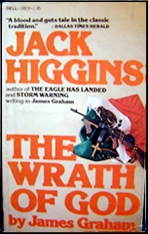
Those are far and away his most entertaining books, Night Judgment on Sinos, Year of the Tiger, A Game of Heroes, East of Desolation (my first), The Run to Morning, and Khufra Run are among the ones I would particularly single out from his his pre-Eagle output. They are not only good books, I’ve reread some of them recently and enjoyed them again.
Along the way he decided that it was more effort to churn out these fast moving short thrillers than to try for something bigger, and one of the names he experimented with in that endeavor was James Graham under which he wrote the fine flying adventure The Last Place God Made and this book, The Wrath of God.
Made has echoes of Nevil Shute, God of Graham Greene. The latter only just edges out the former in my estimation only because I like the fairly cheesy film based on it which I won’t really go into other than to say Robert Mitchum has fun as the phony priest who falls for his own con and Victor Buono gets what may be the only semi heroic role of his career.
I will not kid you it is a good movie, only that it is, for me anyway, a fun one despite the sad figure Rita Hayworth cuts in it as her failing health and mental state were becoming obvious.
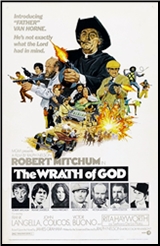
The place is Central America and the time is the 1920’s. The narrator is young ex-IRA gunmen Emmett Keogh for whom the world has become too small and the backwaters of hell seem a good place to lie low. At least they do until he meets Mr. Janos, a fat shady businessman with an ivory headed cane and Father, Oliver Van Horne, a charming American priest. Neither is what they seem. Janos sells illegal arms and Van Horne has a Tommy gun under his cassock and alternates between con artist and bank robber.
All three have run out of places in the world to be.
Which is how the three of them end up under arrest and blackmailed by Colonel Bonilla of the Army into helping topple a mad land owner turned warlord in the small village of Mojada and the surrounding region which is held in the grip of terror by Tomas la Plata, revolutionary, outlaw, madman, and would be dictator.
An army couldn’t pry him out of the region, but maybe a phony priest with a machine gun, an arms dealer, and an IRA gunman/sniper can.
It’s a fairly simple set up that goes back away, the good bad men vs the worse bad men. Arcs of redemption are put into action, tough seasoned hard cases are softened by decent people, love, and the plight of the innocent, and before it is over bloody hell will break out.
But it is written with brio and conviction, the narrator, Keogh, convincingly cynical, tough, and caught up in Oliver Van Horne’s greatest con and his own lingering shreds of idealism.
Writing a book using central casting isn’t always a bad idea.
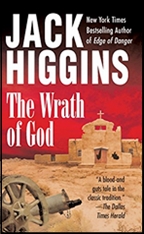
You can guess every turn of the plot well before it happens. There are no surprises here. Our “heroes†will consider stealing the silver hidden in Mojada and double crossing Bonilla, and of course end up doing the right thing while cursing themselves for doing it. Keogh, the youngest, will find love with a local girl.
I’ll go farther and point out that one of the delights of reading Higgins was how much he embraced the more obvious tropes of the genre. He wasn’t one for great invention of plot or character, he instead gave the reader what they wanted in the most straightforward manner possible moving so fast you couldn’t really complain that it was a good sandwich and not a filling meal.
His downfall came when he tried to convince readers it was a multiple course meal and he just didn’t deliver.
Frankly, when I stopped reading him was when he tried to do a bit more and I just didn’t think he really had the chops for it. This and The Last Place God Made are as far as he was really able to stretch himself in more serious terms, and truthfully he only just makes it, but credit where deserved in the end he does pull it off.
Maybe there wasn’t greatness there, but there was something more than the too slick bestselling writer he became. I would highly recommend every book I have mentioned here but The Eagle Has Landed, granting that most of you will probably disagree and may only know Higgins from his later better known works.
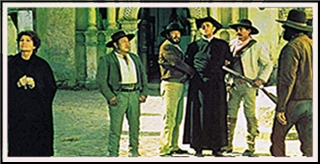
May 15th, 2022 at 11:50 am
I have not read the book, but I have seen the movie, and my review of it is here:
https://mysteryfile.com/blog/?p=50998
PLEASE read all the way through to the end to the Update I added later.
As for Jack Higgins the author, like David, I liked his early ones, not so much his bestsellers. The one very late one I read I thought was worse than reading a first draft. It was like reading his notes for the first draft.
I wish his editors had helped him more. They really did him a disservice.
May 15th, 2022 at 1:15 pm
I’ve not read any ‘jack’ but his paperbacks always irritate me at used bookstores the way they intermingle with George Higgins—not only alphabetically and due to sloppy shelving, but by their interchangeable font and cover styles. I’d be less annoyed if it were the confusion inspired by equally inspired authors Iike ross and john d. macdonald.
May 15th, 2022 at 6:47 pm
It’s been a while since I was at a B&N, but I wonder if either George or Jack Higgins are being sold there, or could it be possible, both? More likely only the latter. George died too long ago to be remembered, Jack only recently.
May 15th, 2022 at 8:36 pm
Both Higgins have an e-book presence, and Jack fairly inexpensive in mostly 1.99 to 3.99 price range for the early ones.
Considering his status I really expected more argument about our dislike of his later work and my fairly tough critique of his ability.
Later Alistair MacLean was like that too, certainly after MacLean’s drinking got the better of him, but even then he wrote BEAR ISLAND and THE LONELY SEA, and early MacLean was much better than the best of Higgins for me.
That rough first draft remark was exactly how his later books feel, as if neither he nor his editors cared and were just pushing product onto shelves.
Clive Cussler at least remained fun, as does his son Dirk, Higgins became a chore to read. flat, cardboard, tired, bereft of any respect for the reader, just bare outlines for the mini series and films he hoped to sell them to.
May 15th, 2022 at 9:43 pm
There’s still time for someone to say they were a fan of Higgins’ work, both early or late, but me, for his later work, I have to believe my own eyes. Sad to say, but so.
But we do have the early ones! Here for example, is my review of THE KHUFRA RUN:
https://mysteryfile.com/blog/?p=36819
May 15th, 2022 at 10:05 pm
Two other pre-EAGLE thrillers, THE SAVAGE DAY and A PRAYER FOR THE DYING, are worth a look-see too. THE WRATH OF GOD had its good points, chiefly Ken Hutchison as Keogh, but what Higgins was able to sell on the printed page didn’t convey well on film, also a drawback with the movie version of EAGLE.
THE WRATH OF GOD came out around the same time as Sergio Leone’s DUCK, YOU SUCKER, also a story about a fugitive IRA gunman in Revolutionary Mexico, but neither film did any better or worse than the other, even though Paula Pritchett as the female lead in WRATH gave Nelson the advantage of a photo layout in PLAYBOY.
Higgins later cannibalised his novel for DILLINGER, a 1983 thriller under the “Harry Patterson” name. At a book signing once, I asked Higgins if he’d consider writing a sequel to THE WRATH OF GOD, since he’d left his hero in a lurch at the end of the story, but he said no, not in the cards.
May 15th, 2022 at 11:02 pm
Harry Patterson is the character played by ClarkGable in Adventure, adapted from the Clyde Brion Davis novel, The Anointed. Often dismissed as a failure, but just the opposite, a resounding success. I do not believe in coincidences, but absolutely in being triggered, which I was after reading the above.
May 16th, 2022 at 12:38 am
Barry,
“Gable’s back and Garson’s got him.”
A better film than its reviews. Thomas Mitchell, as always, is good in it. I saw it again a few years ago and liked it better than my first viewing, but even the first time I didn’t understand its reputation.
September 15th, 2022 at 2:29 am
As withering a review as I’ve ever encountered.
But I honestly cannot find a single point to disagree with. The reviewer is cruel, but fair.
I myself, long ago gave up on Jack Higgins novels, searching for any originality. He was a machine.
It’s even kind of stupendous just how “rote” he executed his ideas. Vaguely similar to Alistair MacLean but with not even that much verve.
On one point only do I disagree: “The Eagle Has Landed”. A marvelous book and movie. The only time Higgins delivered anything even remotely thrilling and magical.
I can’t explain why it has legs, when the author is so hobbled and so hamstrung. It just works (for me), in spite of its noticeable deficiencies.
I don’t know how much of it was borrowed from the stellar, “Went the Day Well?” but even if Higgins did steal anything, both movies are simply swell.
Other items which catch my eye in the above comments:
Greer Garson and Clark Gable are huge fun together in ‘Adventure’. It’s a hoot.
“Duck, You Sucker” (aka, “A Fistful of Dynamite”) is also a fave of mine. Zesty plate of spaghetti western. When did more sticks of TNT ever hurt an actioner? Certainly not this one. And there’s a nifty train wreck too.
“The Wrath of God” –I recall this as only mildly entertaining at best, more so for Hayworth than anything else. Mitchum was much better in “Viva Villa!” with Brynner and Bronson. Now that is one fun movie.
Oh well. Higgins takes a beating but ‘Eagle’ makes up for all his long litany of authorial sin.